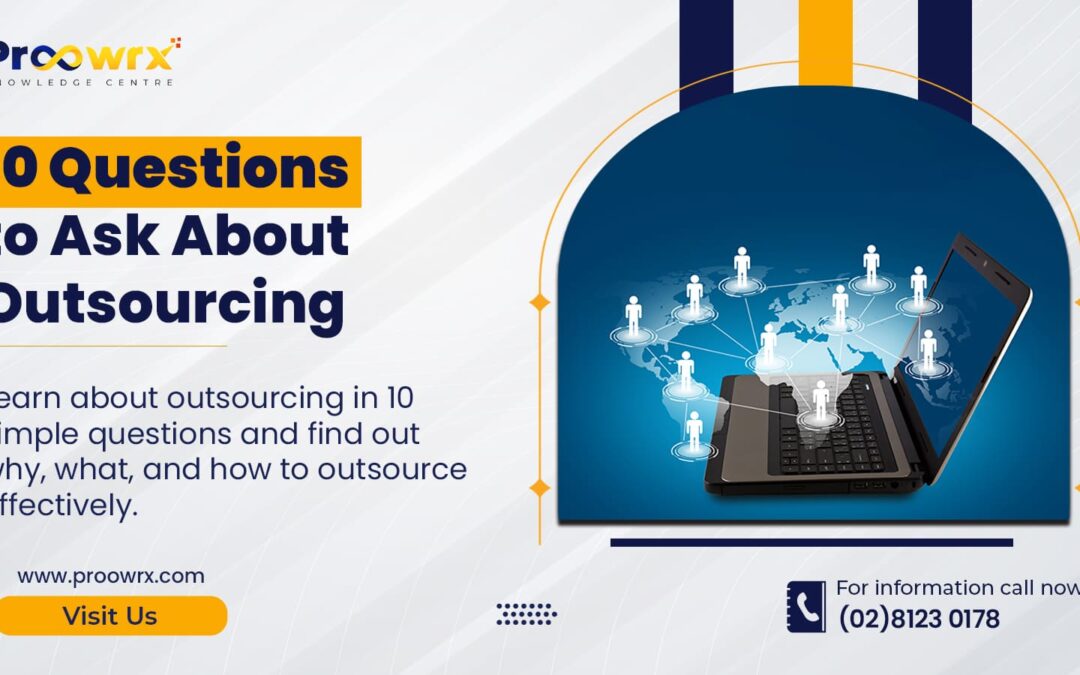You have probably considered outsourcing at some point, regardless of the size of your company. You might have started researching it and approached some of your business contacts for suggestions. Furthermore, it’s likely that you have questions but are unsure of who or where to ask them. In this article, we’ll answer 10 of the most frequently asked outsourcing questions. So continue reading to gather the information you need to decide whether or not to outsource.
If you are a businessman thinking about outsourcing any of your work, you may have been wanting to ask certain questions for a while. Some of them can be answered by us here! The following are some frequently asked questions about outsourcing along with their answers:
1. What are my goals and objectives for outsourcing?
Establish defined goals and objectives before starting on your outsourcing journey. Consider the motivations for outsourcing in the first place. Is it because you want to spend less on labor? Is it so you can give yourself more time for more crucial work-related tasks? Make a list of these justifications and list the goals you hope to accomplish through outsourcing.
However, be sure to establish attainable goals and objectives. Pay attention to the word “ACHIEVABLE.” This will stop disagreements and other associated issues from causing problems down the road. This is an essential stage because many companies have failed at outsourcing because their original aims and objectives were unrealistic.
Instead of keeping these aims and objectives to yourself, share them with all those engaged in the process so that they are also aware of your objectives. They will be aware of exactly how they can assist you, and you will be able to communicate effectively.
You should also realize that the best results from outsourcing take time to appear.
2. Which services or tasks should I outsource?
Without a doubt, one of the most commonly asked questions about outsourcing is this one. Basically, it relies on your company’s requirements and objectives. Any procedure that is required for your business might be outsourced.
It would be best if you started with a non-core service if this was your first time outsourcing. You are now prepared to dig in and expand your outsourcing program into more difficult duties when you have a solid understanding of the concept and how it operates.
The following are the most frequent tasks that companies outsource:
- Loan Processing
- Finance and Accounting
- Customer Support
- Live Chat
- Data Entry
- Research and Development
- Web Design
- Creative Services
- Computer Programming
All of these are crucial tasks, but because they take a lot of time, companies would rather outsource these tasks to outside parties. We also understand the significance of time to businesses. Service providers, after all, have nearly all of the infrastructure and resources required to handle higher workloads.
3. Won’t I lose control of my business?
The answer to this question is NO since outsourcing involves taking over non-core business operations. Actually, the reverse is true. With outsourcing, you may free up more time to manage and take charge of company-impacting tasks like planning and strategy, business development, and collaborations. Outsourcing will definitely help in the expansion of your company when done correctly.
Also keep in mind that depending on the outsourcing model you choose, the service provider’s involvement will change. The ideal outsourcing partner will assist you in selecting the business model.
4. Why should I outsource when I could just hire in-house?
While there are many advantages to having an in-house staff for a business, it can also be expensive and complicated. Every step of the hiring process and employee care involves a large quantity of labor and a budget. Workspace, tools, software, equipment, and many other things are necessary. Fortunately, outsourcing is an option for companies looking to cut costs and avoid stress while still achieving the desired outcome.
You can avoid the tedious task of assembling an internal team by outsourcing. Saving time, money, and effort in hiring candidates is one of the first advantages of outsourcing. While you concentrate on the most essential company tasks, it gives you the assistance you require to keep running even the most basic business processes. The outsourcing service provider will be responsible for managing your outsourced employees. It entails providing them with health benefits, organizing engagement exercises, and other advantages that can inspire and keep them around.
5. Can I outsource even if I’m a small business?
There is a common misunderstanding that outsourcing is only for large corporations, while small businesses do not require it because they have few processes. However, the truth is that anyone can engage in outsourcing. Jobs can be outsourced by small businesses as well. It is intended for everyone who requires assistance running their firm.
One advantage it provides to small businesses is the ability to access skilled workers at a lower cost than recruiting them in-house. Additionally, it can help small businesses grow and stay ahead of the competition.
6. How much access should I give to my outsourcing partner?
There are other actions you can take to ensure you keep control over your project or assignment in addition to selecting the best outsourcing partner. One of the first things to remember is to set clear expectations and be involved in the process.
Unwanted problems can be avoided by having a clear knowledge of how partners will manage and secure sensitive data, including financial information.
Make sure subcontractors understand your policies and get the necessary training.
7. What is the importance of transparency when you Outsource?
Transparency and the five-letter word “trust” are the foundation of successful commercial partnerships. Transparency in the context of outsourcing refers to being able to communicate and see all that goes on within the operations. The outsourcing provider should keep you, the client, up to date on the status of your procedure. Everything should be documented, including the most basic tasks and outcomes, as this increases safety.
You must provide complete transparency if you wish to join the group of companies that successfully outsource. By doing this, you can be sure that you and your outsourcing partner are in agreement, which will quickly lead to mutual trust. Additionally, this will assist you in determining whether to keep outsourcing, particularly with the service provider of your choice.
Additionally, once issues develop, communicate openly and honestly with both the third-party company and your outsourced employees. Always inquire about the reasons and causes for an issue, and try to fully understand them. You can exchange a few recommendations to prevent the recurrence of the issue.
Keeping in regular contact with them and letting them know that you are always available for inquiries and concerns is one method to reduce issues. Arrange for a meeting once a week or once a month to quickly catch up. Reports on a daily or weekly basis will also be beneficial in achieving transparency.
8. How do you ensure that your business and your data are safe?
One of an organization’s most valuable assets these days is data. Therefore, when it comes to protecting clients’ privacy in particular, data security and privacy can aid in avoiding potential income losses. Making sure your data is secure can support your code of ethics, help you maintain and grow your brand, and provide your company an advantage over the competition.
When outsourcing, it’s important to keep in mind the following to safeguard both your company and its data: determine which data needs to be transferred choose a reliable service provider, and store your data in a secure system with a backup copy in a different location.
Selecting a service provider with ISO certification, GDPR compliance, and other relevant data protection certifications would also have a big impact on your organization. These will assist in guaranteeing the security of both your company’s data and operations.
9. What are the advantages and disadvantages of outsourcing?
Outsourcing has its upsides and downsides. On the positive side, it means fewer people on your payroll, giving you more time to focus on other things. Plus, it usually costs less because you can find skilled workers in different parts of the world where wages are lower. On the flip side, it can be tricky to communicate well with people in different time zones, and that might slow things down. Also, you might feel like you’re not in control of the work as much as you’d like. So, while outsourcing can be a smart move, it’s important to think about both the good and the not-so-good aspects before diving in.
10. Where do I start?
Where to start with your journey is the last question on our list of outsourcing questions.
Start by defining your goals and objectives. After identifying these, the next step is to decide which task to outsource. Following that, you may now search for a service provider who best suits your requirements and is a specialist in the particular procedure you wish to outsource.
It would also be ideal to determine which outsourcing model would be most effective for your company. There are two popular models: Managed Services, where the service provider will handle everything, including managing and supervising the activities of your workforce, and workforce Leasing, where you retain complete control over your team. You can get advice from your selected partner on what would be ideal for your company.
After completing all of these, grab a seat; you’re about to go on your outsourcing adventure!
Wrapping Up
The practice of outsourcing is quite advantageous for businesses. Gaining a thorough understanding of the idea in every aspect will help you to maximize its advantages for your business. When you know what questions to ask, it becomes simpler. There are even more questions to be answered, these being only a few of the most popular ones regarding outsourcing.
Got more questions about outsourcing? Look no further than Proowrx! We’re the experts you can trust, backed by brands across industries. Want to cut costs and find top talent? We’ve got you covered! Let’s chat! Book a Discovery Call with Proowrx now and get all the answers you need!

